Related Research Articles
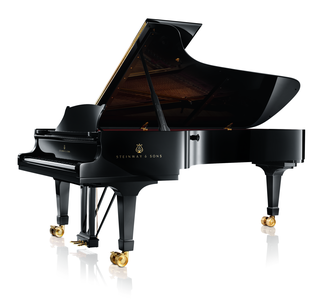
Steinway & Sons, also known as Steinway, is a German-American piano company, founded in 1853 in Manhattan by German piano builder Heinrich Engelhard Steinweg. The company's growth led to the opening of a factory in New York City, United States, and later a factory in Hamburg, Germany. The factory in the Queens borough of New York City supplies the Americas, and the factory in Hamburg supplies the rest of the world.

McLaughlin Motor Car Company Limited was a Canadian manufacturer of automobiles headquartered in Oshawa, Ontario. Founded by Robert McLaughlin, it once was the largest carriage manufacturing factory in the British Empire.

Oshawa is a city in Ontario, Canada, on the Lake Ontario shoreline. It lies in Southern Ontario, approximately 60 km (37 mi) east of Downtown Toronto. It is commonly viewed as the eastern anchor of the Greater Toronto Area and of the Golden Horseshoe. It is the largest municipality in the Regional Municipality of Durham. The name Oshawa originates from the Ojibwa term aazhawe, meaning "the crossing place" or just "a cross".
Kawai Musical Instruments Manufacturing Co., Ltd. is a musical instrument manufacturing company headquartered in Hamamatsu, Shizuoka, Japan. It is best known for its grand pianos, upright pianos, digital pianos, electronic keyboards and electronic synthesizers. The company was founded in August 1927.
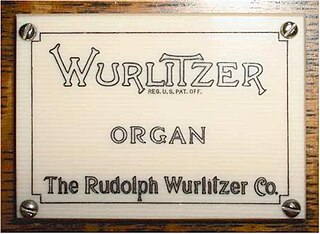
The Rudolph Wurlitzer Company, usually referred to as simply Wurlitzer, is an American company started in Cincinnati in 1853 by German immigrant (Franz) Rudolph Wurlitzer. The company initially imported stringed, woodwind and brass instruments from Germany for resale in the United States. Wurlitzer enjoyed initial success, largely due to defense contracts to provide musical instruments to the U.S. military. In 1880, the company began manufacturing pianos and eventually relocated to North Tonawanda, New York. It quickly expanded to make band organs, orchestrions, player pianos and pipe or theatre organs popular in theatres during the days of silent movies.

The pump organ is a type of free-reed organ that generates sound as air flows past a vibrating piece of thin metal in a frame. The piece of metal is called a reed. Specific types of pump organ include the reed organ, harmonium, and melodeon. The idea for the free reed was imported from China through Russia after 1750, and the first Western free-reed instrument was made in 1780 in Denmark.

Mason & Hamlin is a piano manufacturer based in Haverhill, Massachusetts. Founded in 1854, they also manufactured a large number of pump organs during the 19th century.
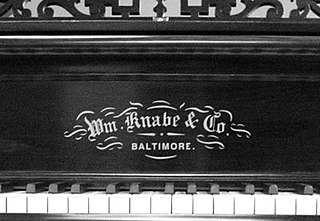
Wm. Knabe & Co. was a piano manufacturing company in Baltimore, Maryland from the middle of the nineteenth century through the beginning of the 20th century, and continued as a division of Aeolian-American at East Rochester, New York until 1982. It is currently a line of pianos manufactured by Samick Musical Instruments.
Heintzman & Co. is a celebrated Canadian piano manufacturer, formerly based in the Toronto area, whose instruments retain a reputation for quality of workmanship and fineness of tone.

Lado Musical Inc. is a Canadian guitar manufacturing company owned and operated by Joe Kovacic. The company is based in Lindsay, Ontario and produces electric guitars and basses. Vintage-custom, hand made Lado guitars remain some of the most sought after guitars in the world to date.
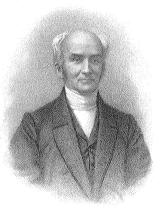
Timothy Gilbert was an American piano manufacturer, abolitionist and religious organizer in Boston, Massachusetts. His brother Lemuel Gilbert was also a piano manufacturer.
Lindeman was a name used by a series of piano manufacturers in New York in the nineteenth and twentieth centuries. The concern was founded by William Lindeman (1794–1875) on a small scale in Dresden in about 1822, and reestablished by him in New York City in 1835 or 1836, where it grew to a medium size within twenty years. American piano historian Daniel Spillane credited him as one of the first successful immigrant German piano makers in the United States.

Frederick Mathushek was a piano maker who worked in Worms, Germany, and in New York City and New Haven, Connecticut, during the second half of the nineteenth century. His name was used by several different piano manufacturers through the 1950s, and was filed independently as a trademark for musical instruments in 2005 and 2008.

Theodor August Heintzman was a German-Canadian piano manufacturer and inventor, best known for founding the piano company which still bears his name.

Estey Organ Company was an organ manufacturer based in Brattleboro, Vermont. The company was founded in 1852 by Jacob Estey, who bought out another Brattleboro manufacturing business. At its peak, the company was one of the world's largest organ manufacturers, employed about 700 people, and sold its high-quality items as far away as Africa, Great Britain, Australia, and New Zealand. Estey built around 500,000 to 520,000 pump organs between 1846 and 1955. Estey also produced pianos, made at the Estey Piano Company Factory in New York City.

The Aeolian Company was a musical-instrument making firm whose products included player organs, pianos, sheet music, records and phonographs. Founded in 1887, it was at one point the world's largest such firm. During the mid 20th century, it surpassed Kimball to become the largest supplier of pianos in the United States, having contracts with Steinway & Sons due to its Duo-Art system of player pianos. It went out of business in 1985.
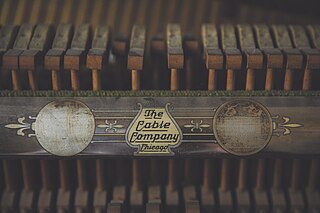
The Cable Company was an American manufacturer and distributor of pianos and reed organs that operated independently from 1880 to 1936.
Comus S.p.A. is an Italian musical instrument manufacturer, best known for manufacturing electronic and electric small home organs and chord organs, as well as musical toys. In the late 1980s the business was Europe's largest manufacturer of keyboard instruments. Comus was owned by the larger Bontempi musical instrument company, for whom they build chord organs.

Pedlar People Limited was a sheet metal stamping operation started in 1861 in Oshawa, Ontario by blacksmith Henry Pedlar in the back of his hardware store. The operation was expanded by his son, George H. Pedlar, to become the largest sheet metal factory in the British Empire. The business was in operation until forced into receivership in 1982. Pedlar People, together with several other small manufacturing operations enabled Oshawa to be considered the "Manchester of Canada."
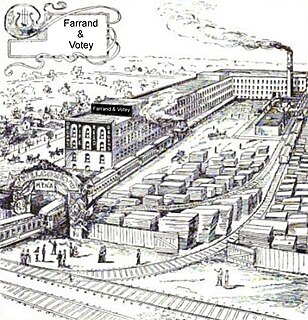
Farrand & Votey Organ Company was a nineteenth-century manufacturer of pianos, reed and pipe organs, and player pianos located in Detroit, Michigan. It evolved from William R. Farrand and Edwin S. Votey, hence the name of Farrand & Votey. The company is the development of the old Detroit Reed Organ Company that was originally bought out in 1881. The Farrand & Votey Organ Company produced 7,200 instruments a year by 1889. The company made huge organs on special order contracts. In 1891 the company built a monumental 2,700 pipe organ for the Detroit's First Presbyterian Church. In 1893 it built a huge organ for the Chicago World's Fair, where it was played in recitals by world-renowned organists. In 1897 it built the nation's largest pipe organ. The company dissolved in 1897 and split up into two separate companies of the owners, each making their own style of organs.
References
- 1 2 3 "R.S. Williams & Sons". The Canadian Encyclopedia, by Helmut Kallmann, Carl Morey, and Florence Hayes, February 7, 2006
- 1 2 Under the Sign of the Big Fiddle: The R.S. Williams Family, Manufacturers and Collectors of Musical Instruments . Dundurn; 15 October 1996. ISBN 978-1-896219-17-2.
- ↑ Emerson Bristol Biggar. Canada: A Memorial Volume . E. B. Biggar; 1889. p. 11.
- ↑ "History of Toronto and County of York in Ontario - Part IV: Toronto: Manufacturing Industries". 1885. via the "Electric Canada" website
- ↑ "LH1039 Williams Piano co. - Exterior". Oshawa Library photograph collection, via Our Ontario, accessed Feb 19, 2020
- ↑ Bob Pierce. Pierce Piano Atlas . Bob Pierce; 2008. p. 393.
- ↑ Musical Courier . Vol. 18-19. 1889. p. 480.
- ↑ "The Music Trade" Musical Courier . Vol. 23. 1891. p. 110.
- ↑ "Nickel Notes". AMICA Bulletin, January/February 2014.
- ↑ Rotunda . Vol. 15-17. Royal Ontario Museum.; 1982. p. xliv.
- ↑ Robert F. Gellerman. Gellerman's International Reed Organ Atlas . Vestal Press; 5 May 1998. ISBN 978-1-4617-3135-1. p. 268.
- ↑ Pictorial Oshawa, by Thomas Bouckley, page 6